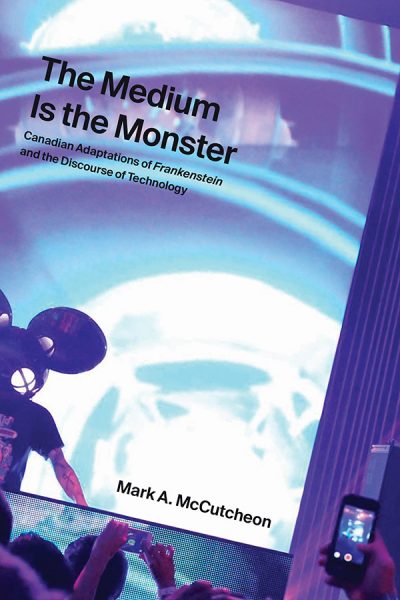How Canadians Communicate III Contexts of Canadian Popular Culture
edited by Bart Beaty, Derek Briton, Gloria Filax, and Rebecca Sullivan

Subjects: Canadian Studies, Communication Studies, Cultural Studies, Film, Literary Theory and Criticism, Technology and Society
Imprint: AU Press
Technology, a word that emerged historically first to denote the study of any art or technique, has come, in modernity, to describe advanced machines, industrial systems, and media. McCutcheon argues that it is Mary Shelley’s 1818 novel Frankenstein that effectively reinvented the meaning of the word for modern English. It was then Marshall McLuhan’s media theory and its adaptations in Canadian popular culture that popularized, even globalized, a Frankensteinian sense of technology. The Medium Is the Monster shows how we cannot talk about technology—that human-made monstrosity—today without conjuring Frankenstein, thanks in large part to its Canadian adaptations by pop culture icons such as David Cronenberg, William Gibson, Margaret Atwood, and Deadmau5. In the unexpected connections illustrated by The Medium Is the Monster, McCutcheon brings a fresh approach to studying adaptations, popular culture, and technology.
From dance culture to scifi to Big Oil, Mark McCutcheon traces the McLuhanesque Frankenphemes of technological monstrosity—and their threat of future mischief—with an intensity that won't let you put this book down.
Richard Cavell, author of Remediating McLuhan
In this groundbreaking work, Mark McCutcheon wrestles with the question of what is distinctively Canadian about contemporary literary, cinematic, scholarly, and popular cultural adaptations of the Frankensteinian myth-eme. McCutcheon’s answer is seemingly simple at first glance: each of these adaptations/discourses bears the undeniable imprint of Marshall McLuhan’s influence. Yet that seemingly simple answer evolves, as the book proceeds into a detailed genealogy of these complex ‘Frankenphemes,’ always sensitive to the nuances of cultural production, which, in McCutcheon’s interpretation, often take an ‘ironic’ or ‘parodic’ turn, through Canada’s ambivalent cultural positioning. Ultimately, McCutcheon also argues for the diffusion of this McLuhanite interpretation of technology beyond Canadian borders to become a global and multifarious 'figure of manufactured monstrosity.' An erudite, compelling, and timely must-read for scholars of postcolonial theory, adaptation studies, and media, communication, literary, cinematic, and cultural studies.
Caroline Joan “Kay” S. Picart, Esq., author of Remaking the Frankenstein Myth on Film
McCutcheon offers an expert explication/application of McLuhan that contributes to the revival of interest in and understanding of the significance of his work. In his application of McLuhanesque thought to seminal Canadian science fiction texts and other cultural products, McCutcheon makes a valuable contribution to Canadian studies, especially in the areas of media, film, and genre studies. This book opens up new ways to read and understand figures about whom much has been written (Shelley, Gibson, and Cronenberg), while also bringing welcome attention to figures hitherto given less recognition than they merit.
Dominick Grace, Brescia University College
McCutcheon exhibits commendable acuity as a close reader not only of literary texts but also of film, music, and related cultural products. […] His ambitious and well-written study should be of great interest to Canadians, sf scholars, and everyone else interested in the relations among technology, media, and contemporary popular culture.
—Science Fiction Studies
An excellent guidepost to start a reader on a journey of technological discourse and cultural exploration.
—Canadian Journal of Communication
This work is licensed under a Creative Commons License (CC BY-NC-ND 4.0). It may be reproduced for non-commercial purposes, provided that the original author is credited.